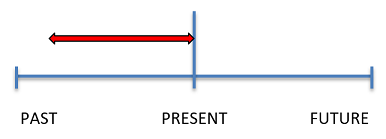Prezentul perfect
(Present perfect)
Introducere
Folosim prezentul perfect pentru a descrie trecutul atunci când acesta afectează prezentul, de exemplu:- când vorbim despre experiențe trecute
- când ne referim la ceva ce a început în trecut și este încă adevărat
- pentru a descrie schimbări.

Exemple:
- I have been to that restaurant twice.
- Emily has worked in the city for many years.
- Your hair has grown since last year.
Forma nr. 1 - Forma afirmativă a prezentului perfect
Pentru forma afirmativă a prezentului perfect, folosim"have" + participiul trecut.
| Subiect | "have" | participiul trecut | |
|---|---|---|---|
|
I
You We They |
have
've |
been |
to India. |
| He / She / It |
has
's |
Participiul trecut
Pentru verbele regulate, formăm participiul trecut adăugând-le terminația "–d", "–ed" sau "–ied", de exemplu:
| verbe regulate | ||
|---|---|---|
| infinitiv | participiul trecut | |
| receive | received | "-d" pentru verbe regulate care se termină în "e" |
| work | worked | "-ed" pentru verbe regulate care se termină într-o consoană |
| study | studied | "-ied" pentru verbe regulate care se termină într-o consoană și "y" |
Participiul trecut al verbelor neregulate este diferit și trebuie învățat separat, de exemplu:
| verbe neregulate | |
|---|---|
| infinitiv | participiul trecut |
| be | been |
| do | done |
| eat | eaten |
| find | found |
| go | gone |
| grow | grown |
| have | had |
| make | made |
| see | seen |
Exerciții
Completați propozițiile cu forma afirmativă a prezentului perfect pentru verbele dintre paranteze:.
Forma nr. 2 - Forma negativă a prezentului perfect
Pentru forma negativă a prezentului perfect, folosim"have not" + participiul trecut.
| Subiect | "have not" | participiul trecut | |
|---|---|---|---|
|
I
You We They |
have not
haven't 've not |
eaten |
breakfast yet. |
| He / She / It |
has not
hasn't 's not |
Exemple:
- I haven't been to Paris before.
- My order hasn't arrived yet.
- My parents haven't finished painting the house.
Exerciții
Completați propozițiile cu forma negativă a prezentului perfect pentru verbele dintre paranteze:.
Forma nr. 3 - Forma interogativă a prezentului perfect
Pentru forma interogativă a prezentului perfect, folosim"have" + subiect + participiul trecut.
| "have" | Subiect | participiul trecut | |
|---|---|---|---|
| Have |
I
you we they |
seen |
my purse? |
| Has | he / she / it |
Exemple:
- Have you been to Italy before?
- Has it stopped raining?
- How long have you studied English?
Exerciții
Completați propozițiile cu forma interogativă a prezentului perfect pentru verbele dintre paranteze:.
Exerciții suplimentare
Completați propozițiile cu răspunsul corect dintre a, b, c sau d:.
Aspect lingvistic suplimentar
Pentru forma afirmativă a prezentului perfect folosim și "always" și "never".Folosind "never", sensul devine negativ:
| Subiect | "have" | perioadă | participiul trecut | |
|---|---|---|---|---|
|
I
You We They |
have |
always
never |
lived | in the city. |
|
He
She It |
has |
Pentru forma interogativă a prezentului perfect folosim și "always" și "ever".
| "have" | Subiect | perioadă | participiul trecut | |
|---|---|---|---|---|
| Have |
I
you we they |
always
never |
lived | in the city. |
| Has |
he
she it |
Exemple:
- Have you ever been to Mexico?
- Has she always lived in Paris?
Create a free Getting Started account
Link-uri conexe
Următoarele exerciții includ utilizarea acestei structuri gramaticale:
V-ar putea interesa și:
- Exerciții de vocabular engleza pentru afaceri
- Grafice și diagrame Cont Pro
- Ascultare Cont Pro
- Citire Cont Pro
- Scenario-based dictation exercises – business English Cont Pro
- Scenario-based dictation exercises – general English
V-ar putea interesa și:
Beginner
- Trecutul simplu
- Trecutul continuu
- Prezentul simplu
- Prezentul continuu (prezent)
- Prezentul perfect
- 'Going to' și 'will'
- Prezentul continuu (viitor)
- Imperativul
- To be (a fi)
- Pronume: subiect, obiect
- Pronume: relative
- Adjective și pronume posesive
- Adjective și pronume demonstrative
- Ordinea adjectivelor
- Întrebări cu WH (pronume interogative)
- Articole: a, an, the
- Prepoziții: timp și spațiu
- There is/ there are și cuantificatori
- Conjuncțiile and, or, but
- Comparative / superlative (than)
- Fraza condițională de tip 0 (if)
- Fraza condițională de tip 1 (if)
- Verbe modale: can/can't, could, will, shall
- Structuri verbale
- Sequence adverbs
Nivel intermediar
- Mai mult ca perfectul
- Trectul simplu vs. Prezentul perfect
- Trecutul simplu vs. Trecutul continuu
- Prezentul perfect continuu
- Viitorul simplu
- Viitorul continuu
- Passive
- Vorbirea indirectă
- Used to/would
- Fraza condițională de tip 2
- Fraza condițională de tip 3
- Propoziții relative
- Pronume reflexive
- Verbe modale: must, have to, should, should have
- Structuri verbale: gerunziu sau infinitiv
- Adverbe de grad
- Ordinea adjectivelor
- Adjective: ed sau ing
Grammar
Identificați rapid și concentrați-vă asupra problemelor de gramatică:
- Foi de lucru și teste gramaticale
- Scenario-based grammar exercises
- Grammar additional practice questions
- Exerciții cu conjugarea verbelor
- Exerciții cu condiționalul
Îmbunătățiți-vă gramatica
Vocabular
Vocabulary exercises:Extindeți-vă vocabularul folosind cei trei antrenori de vocabular:Exersați-vă ortografia folosind cele trei teste de ortografie:Exersați vocabularul referitor la grafice și diagrame:
Lecții de vocabular
Exerciții de dictare
Exersați-vă abilitățile de ascultare și ortografia folosind exercițiile noastre de dictare:
- Scenario-based dictation exercises - general English
- Scenario-based dictation exercises - business English
- Dictare: accentul pe gramatică
- Numere
Realizați exerciții de dictare
Lecții video
Concentrați-vă pe anumite zone din engleza pentru afaceri folosind lecțiile noastre video:
Participați la o lecție video





